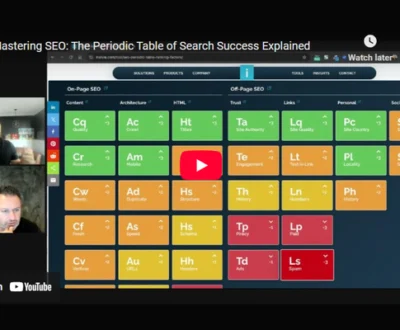I start local keyword research by listing my core products and services, then brainstorm terms customers use, including local dialects. Adding city or neighborhood names boosts relevance for nearby searches. I use Google Business Profile and keyword tools to find popular local phrases, optimizing my website and profile with these. Monitoring competitors helps uncover keyword gaps I might miss. Tracking performance lets me refine my strategy over time to improve visibility. This approach sets the foundation for deeper local SEO success.
- Key Takeaways
- Understanding the Importance of Local Keyword Research
- Identifying Core Products and Services for Your Business
- Brainstorming Keywords From a Customer’S Perspective
- Incorporating Geographic Modifiers for Local Relevance
- Using Google Business Profile to Expand Keyword Ideas
- Leveraging Keyword Research Tools for Local Insights
- Analyzing Local Competitors’ Keyword Strategies
- Finding Keyword Gaps and Untapped Opportunities
- Mapping Keywords to Website and Google Business Profile
- Monitoring and Adjusting Your Local Keyword Strategy
- Frequently Asked Questions
- Final Thoughts
Key Takeaways
- Identify core products and services by analyzing customer needs, competitor gaps, and common terminology from reviews and support interactions.
- Incorporate geographic modifiers like city names and neighborhoods with core keywords to boost local relevance and search rankings.
- Optimize your website and Google Business Profile by naturally integrating geo-modified keywords in titles, descriptions, and content.
- Use Google Business Profile insights and keyword research tools to uncover local search terms and monitor keyword performance.
- Create dedicated location-specific pages with accurate NAP, local landmarks, and targeted keywords to enhance local SEO authority.
Understanding the Importance of Local Keyword Research
Although many small businesses focus on general marketing strategies, understanding the importance of local keyword research can greatly improve their online visibility and customer reach.
Paying attention to local search trends helps you identify the exact terms potential customers use when looking for services in your area. This insight guarantees your keywords have strong relevance to your target audience, making your business easier to find on platforms like Google Search and Google Maps.
By using location-specific keywords, you increase the chances of appearing higher in search results, which is vital in a competitive local market. Local keyword research also reveals search behaviors and preferences unique to your community, allowing you to tailor your content and SEO efforts effectively. Optimizing your Google Business Profile with local keywords further enhances your chances of being found by nearby customers.
Identifying Core Products and Services for Your Business
To build an effective local SEO strategy, you need to clearly identify the core products and services your business offers. This means understanding which offerings truly define your business and appeal most to your target market. Focusing on your core offerings helps you create relevant keywords that match customer intent.
Here’s how I approach this:
- List all current products and services, then highlight those that solve your customers’ main problems.
- Analyze which offerings generate the most sales or profit, not just revenue. It’s important to avoid spreading yourself too thin by trying to promote too many products or services at once.
- Research your target market’s needs and preferences to guarantee alignment with your key offerings.
- Evaluate competitors to find gaps you can fill or unique selling points to emphasize.
Concentrating on these steps clarifies what you do best and guides your local keyword research to attract the right audience efficiently.
Brainstorming Keywords From a Customer’S Perspective
How do customers actually talk about the products or services you offer? To brainstorm keywords effectively, I focus on customer terminology rather than industry jargon.
I analyze interaction data from reviews, calls, and support logs to spot common words and pain points customers express. This pain point analysis helps me understand the search intent behind their queries.
I also consider local dialects and explore synonyms customers might use, like "auto repair" instead of "mechanic."
Question identification is essential too; I look for common questions customers ask to capture informational searches.
Developing persona insights allows me to tailor keywords for different customer segments, considering their unique language and needs.
Combining these approaches guarantees that the keywords reflect real customer language and intent, making the research more relevant and effective for local search optimization.
Incorporating Geographic Modifiers for Local Relevance
Incorporating geographic modifiers is an essential step in tailoring your keyword strategy for local search success. Geo modifier examples like "dentist in Seattle" or "coffee shop near me" signal local intent, helping search engines connect users with businesses nearby.
To use these effectively, consider these key points:
- Identify relevant geographic terms, including city names, neighborhoods, or nearby landmarks your customers might use.
- Combine core keywords with these modifiers to create geo-modified keywords that reflect local searches.
- Use these keywords naturally in your website’s titles, descriptions, headers, and content to improve local visibility.
- Recognize that geo-modifiers boost click-through and conversion rates by matching user intent with precise location info.
Using Google Business Profile to Expand Keyword Ideas
Although many small business owners focus primarily on optimizing their websites, the Google Business Profile (GBP) offers a valuable opportunity to expand keyword ideas directly tied to local customer behavior.
By using Google Insights within your GBP dashboard, you can access performance data showing the exact search queries customers use to find your business. This reveals user intent and the specific language your local audience prefers.
Additionally, analyzing customer reviews and the Q&A section uncovers recurring keywords and concerns, helping you tailor your profile content more effectively. You can also create Google Posts incorporating these keywords to test their impact in real-time.
Optimizing your business description and product listings with relevant terms, based on this data, improves your local search relevance.
Leveraging Keyword Research Tools for Local Insights
Expanding your keyword research beyond Google Business Profile data can reveal a broader set of local search terms that potential customers use.
Leveraging keyword research tools helps me uncover valuable insights about local intent and keyword trends, which shape effective local SEO strategies. Here’s how I use these tools for local insights:
- I start by generating seed keywords related to my business and filter results by location to find region-specific search terms.
- I analyze keyword metrics like search volume and difficulty to prioritize terms with manageable competition and strong local intent.
- I explore related keywords and “near me” phrases to capture emerging keyword trends and long-tail variations.
- I use specialized local SEO tools to monitor local pack rankings and understand how my keywords perform in specific geographic areas.
Using these methods guarantees my keyword list targets real local demand, helping small businesses connect with nearby customers effectively.
Analyzing Local Competitors’ Keyword Strategies
When I analyze local competitors’ keyword strategies, I start by identifying which businesses consistently appear in top search results for my target terms. I focus on competitor keyword analysis by examining their website content, Google Business Profiles, and backlink profiles. This helps me understand how they maintain local search visibility and what keywords they prioritize.
To organize my findings, I use a table like this:
| Competitor Name | Top Keywords | Local Search Visibility Score |
|---|---|---|
| Competitor A | "plumber near me" | High |
| Competitor B | "emergency plumbing" | Medium |
| Competitor C | "24/7 plumber" | High |
| Competitor D | "affordable plumber" | Low |
| Competitor E | "licensed plumber" | Medium |
This side-by-side comparison highlights keyword overlaps and gaps, guiding me in refining my own local keyword strategy effectively.
Finding Keyword Gaps and Untapped Opportunities
Identifying keyword gaps and untapped opportunities is essential for small businesses aiming to improve local search visibility. By conducting thorough competitor analysis, I uncover keywords they rank for but my business doesn’t, revealing valuable openings.
Keyword clustering helps me group related terms, making it easier to target underserved areas strategically. Here are four effective tactics I use:
- Utilize keyword research tools like Semrush or Ahrefs to find low-competition, location-specific keywords with decent search volume.
- Explore Google’s features—Autocomplete and “People Also Ask”—to discover natural user queries that competitors might overlook.
- Monitor online communities, social media, and customer reviews to extract local jargon and question-based keywords reflecting real concerns.
- Analyze search intent carefully to guarantee chosen keywords align with my services and target audience’s needs, avoiding irrelevant terms.
This approach highlights gaps and uncovers opportunities, helping small businesses stand out in local search results.
Mapping Keywords to Website and Google Business Profile
I’ll start by assigning keywords strategically to specific pages on your website, making sure each one targets a clear service or location.
Then, I’ll optimize your Google Business Profile by naturally integrating those keywords into descriptions and posts, helping your local presence stand out.
Creating location-specific pages also plays a key role, as it lets you address unique search intents and improve your site’s relevance for different areas.
Assigning Keywords Strategically
Although keyword research provides a list of valuable terms, assigning those keywords strategically to your website and Google Business Profile (GBP) is crucial for effective local SEO.
I recommend focusing on keyword prioritization informed by competitive analysis to decide which terms deserve top placement. Here’s how I approach it:
- Map specific keywords to distinct website pages to avoid cannibalization, such as service pages or location pages.
- Use broad, branded, and primary city keywords on your homepage to anchor your site.
- Incorporate relevant keywords naturally into GBP elements like business description and services.
- Confirm consistency between website and GBP details, especially Name, Address, and Phone (NAP).
This strategic assignment builds a clear SEO blueprint that targets local search intent effectively.
Optimizing Google Business Profile
Once you’ve assigned keywords strategically across your website, the next step involves integrating those terms naturally within your Google Business Profile (GBP).
Since GBP doesn’t have a dedicated keyword field, I focus on GBP optimization techniques that place local keywords in key sections like the Business Description, Products, Services, Posts, and Q&A.
For example, I include primary keywords within the first 250 characters of the Business Description to improve relevance without stuffing. I also incorporate location-based keywords naturally into product titles and service descriptions to boost local search visibility.
Regularly publishing keyword-rich posts and managing the Q&A section helps maintain engagement and local relevance.
This local keyword placement guarantees your GBP complements your website, improving your chances of appearing in local search results.
Creating Location-Specific Pages
When you want to improve your local search presence effectively, creating location-specific pages on your website is essential.
These pages help search engines recognize your business’s relevance in each area by using clear page structure and unique location content. Here’s how to approach it:
- Use one domain with dedicated pages for each location, ensuring logical URLs like domain.com/locations/city/.
- Include accurate Name, Address, Phone (NAP), hours, and local details such as landmarks or events.
- Optimize each page with targeted local keywords in titles, headings, and throughout the content.
- Add structured data markup and embed Google Maps for better search visibility and user experience.
This strategy aligns your website and Google Business Profile, boosting local authority and attracting high-intent visitors.
Monitoring and Adjusting Your Local Keyword Strategy
I keep a close eye on how my local keywords rank by using tools that show changes over time and across different areas.
When I notice shifts in search trends, I analyze them to decide if my current keywords still match what people are searching for.
This helps me update my keyword targeting to stay relevant and improve my local search performance.
Track Keyword Rankings
Tracking your local keyword rankings is a crucial step in measuring how well your SEO efforts are paying off. By monitoring keyword performance in local search results, you gain insights into your business’s visibility and can quickly address any drops.
To track effectively, I recommend these four steps:
- Select keywords with strong local intent, including geographic terms tied to your service area.
- Use local rank tracking tools like Brightlocal or SEMrush to monitor rankings on Google Search and Maps.
- Review key metrics beyond rank, such as Google Business Profile views and local pack visibility.
- Adjust your strategy by optimizing pages, refining your keyword list, and tracking competitors’ performance.
This ongoing process helps guarantee your local SEO investments deliver measurable results.
Analyze Search Trend Changes
Although local keyword rankings provide valuable information, analyzing search trend changes offers deeper insight into how your audience’s behavior and preferences evolve over time.
Monitoring shifts in search behavior helps me anticipate changes brought by algorithm updates and the growing prominence of voice search. I rely on tools like Google Trends and Search Console to track these patterns and identify emerging long-tail, conversational queries.
Trend prediction allows me to adjust strategies before outdated keywords lose relevance. Recognizing how voice search alters local queries, especially “near me” phrases, is essential for maintaining visibility.
Update Keyword Targeting
Effective local keyword strategies depend on continuous monitoring and timely adjustments to stay relevant in a competitive market.
I regularly update keyword targeting by tracking keyword trends and aligning with evolving search intent. Here’s how I manage it:
- Use tools like Google Search Console and Semrush to monitor local keyword rankings and organic traffic.
- Analyze user engagement metrics to assess if content matches local search intent.
- Conduct competitor analysis to identify gaps and emerging local keywords.
- Refresh keyword lists semi-annually to incorporate new terms and drop underperforming ones.
Frequently Asked Questions
How Often Should I Update My Local Keyword List?
I update my local keyword list regularly, combining keyword maintenance with seasonal updates to stay relevant. Typically, I review it quarterly but adjust more often if trends or business changes demand it, keeping my strategy sharp and effective.
Can Social Media Impact Local Keyword Effectiveness?
Imagine a telegram delivering news—social media engagement acts like that, boosting local content visibility. I’ve seen how active sharing and interaction indirectly enhance local keyword effectiveness by driving traffic and building trust in your community.
What’S the Best Way to Handle Multi-Location Keyword Targeting?
When handling multi-location strategy, I focus on creating unique pages targeting location specific keywords for each spot. This guarantees relevance, avoids duplication, and boosts local search visibility, helping each location stand out individually in search results.
How Do Voice Searches Affect Local Keyword Research?
Did you know 58% of consumers use voice search for local info? Voice search optimization means focusing on conversational keywords—natural, question-based phrases that match how people actually speak when searching nearby businesses.
Should I Use Keywords in Online Reviews for Local SEO?
I believe keyword placement in online reviews helps local SEO, but only if review authenticity stays intact. Encouraging genuine, detailed feedback naturally includes keywords without forcing, boosting relevance and trustworthiness in search results.
Final Thoughts
Local keyword research is like planting seeds in your community’s soil—each well-chosen term helps your business grow visibly where it matters most. By understanding your core offerings, thinking like your customers, and using tools like Google Business Profile, you can uncover valuable opportunities. Regularly revisiting your strategy guarantees your presence stays strong and relevant. With careful attention, your local keywords will guide potential customers right to your door, fostering steady, sustainable growth.
Windee Tan is a seasoned SEO Specialist with over a decade of experience helping businesses grow their organic visibility through data-driven strategies. He specializes in technical SEO, content optimization, and local search, with deep knowledge of tools like GA4, GSC, SEMrush, and Screaming Frog. Windee is passionate about translating complex SEO insights into practical tactics that drive real-world results. When he's not auditing sites or crafting keyword strategies, he’s exploring the latest trends in AI, digital marketing, and productivity.
About this blog
We are a digital marketing company with a focus on helping our customers achieve great results across several key areas.
Request a free quote
We offer professional SEO services that help websites increase their organic search score drastically in order to compete for the highest rankings even when it comes to highly competitive keywords.
Subscribe to our newsletter!
More from our blog
See all postsRecent Posts
- Step-by-Step Keyword Research for Affiliate Marketers 1 November 2025
- How to Do Keyword Research for Multilingual SEO? 20 October 2025
- Writing Clear Calls to Action That Boost On-Page SEO 21 August 2025









